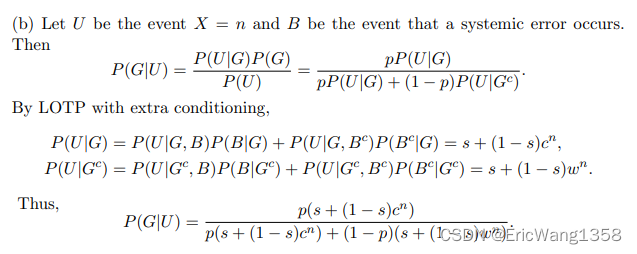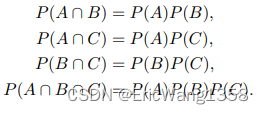C1
Definition 1.2.1 (Sample space and event)
Example 1.2.2 (Coin flips).
Definition 1.3.1 (Naive definition of probability)
where the naive definition is applicable:
Theorem 1.4.1 (Multiplication rule).
h 1.4.11 (Labeling objects)
Example 1.4.12 (Leibniz’s mistake)
1.4.2 Adjusting for overcounting
Theorem 1.4.15 (Binomial coefficient formula).
Example 1.4.18 (Permutations of a word)
Example 1.4.22 (Bose-Einstein)
choose k times from a set of n objects with replacement,if order doesn’t matter
is n+k-1 choose k
1.5 Story proofs
Example 1.5.1 (Choosing the complement)
Example 1.5.2 (The team captain)
Example 1.5.3 (Vandermonde’s identity)

Example 1.5.4 (Partnerships).

Definition 1.6.1 (General definition of probability)
1.axiom
2.union
Theorem 1.6.3 (Inclusion-exclusion)
Example 1.6.4 (de Montmort’s matching problem)

C2
Definition 2.2.1 (Conditional probability)
Intuition 2.2.3 (Pebble World)
Intuition 2.2.4 (Frequentist interpretation)
Example 2.2.5 (Two children)
Example 2.2.6 (Random child is a girl)
Example 2.2.7 (A girl born in winter)
Theorem 2.3.1 (Probability of the intersection of two events).
Theorem 2.3.2 (Probability of the intersection of n events)
Theorem 2.3.3 (Bayes’ rule)
Definition 2.3.4 (Odds).
Theorem 2.3.5 (Odds form of Bayes’ rule).
Theorem 2.3.6 (Law of total probability).
Example 2.3.7 (Random coin). ( Fair coin )
h 2.3.8 (Prior vs. posterior). ( to distinguish)
Example 2.3.9 (Testing for a rare disease).
2.4 Conditional probabilities are probabilities
h 2.4.1.When we write P(A|E),is a probability function which assigns probabilities in accordance with the knowledge
Theorem 2.4.2 (Bayes’ rule with extra conditioning)
Theorem 2.4.3 (LOTP with extra conditioning).
Example 2.4.4 (Random coin, continued)

Example 2.4.5 (Unanimous agreement).

Definition 2.5.1 (Independence of two events).
h 2.5.2. Independence is completely different from disjointness.
Definition 2.5.4 (Independence of three events).
Example 2.5.5 (Pairwise independence doesn’t imply independence)


Definition 2.5.6 (Independence of many events)
Definition 2.5.7 (Conditional independence).
h 2.5.8.Two events can be conditionally independent given E, but not independent given Ec
Example 2.5.9 (Conditional independence given E vs. given Ec ).
Example 2.5.10 (Conditional independence doesn’t imply independence).
Example 2.5.11 (Independence doesn’t imply conditional independence)
2.6 Coherency of Bayes’ rule

2.7 Conditioning as a problem-solving tool
we knew whether E happened or not, we can condition on E and then on Ec , consider these possibilities separately, then combine them using LOTP
2.7.2 Strategy: condition on the first step
The strategy of first-step analysis works here because the problem is self-similar in nature
Example 2.7.3 (Gambler’s ruin).

2.8 Pitfalls and paradoxes
2.8.1 (Prosecutor’s fallacy)
h 2.8.2 (Defense attorney’s fallacy).
Example 2.8.3 (Simpson’s paradox)

























 被折叠的 条评论
为什么被折叠?
被折叠的 条评论
为什么被折叠?








